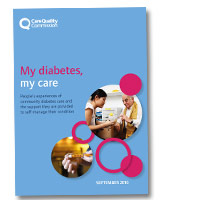
Since 1996, the percentage of adults in England with diabetes has doubled. My diabetes, my care looks at people's experiences of diabetes care across England and the support they are given to self-manage their condition.

This review considers how well care services work together to deliver high-quality diabetes care. It also makes a number of recommendations for how health and social care commissioners, providers and professionals should work together to improve diabetes care and prevention.
What we did
We asked people aged 18 to 65 years who have Type 1 or Type 2 diabetes to tell us about their experiences of care. We also spoke to commissioners, services and staff in 10 different locations about how they deliver community diabetes care.
We included a specific focus on black and minority ethnic groups and people with a learning disability, as people in both groups are more likely to develop diabetes and have poorer health experiences and outcomes.
What we found
We found there is variation in some aspects of care at local level, including many examples where diabetes care is working well that we encourage others to learn from.
Specifically we found that:
- Most people we spoke with received the checks recommended by The National Institute for Health and Care Excellence (NICE). Generally, people reported they were able to discuss their care with primary care staff and they felt they received good explanations about their care.
- People at high risk of developing Type 2 diabetes were not always identified early enough, or supported to manage their risk.
- Some people need more emotional support when they are diagnosed and on an ongoing basis. This includes those with Type 2 diabetes, where the need might be more than expected.
- People who attended structured education courses felt it improved their ability and confidence to manage their condition. However, the courses were not able to meet everyone's needs and there were not always clear alternatives for those who did not attend.
- People did not always know or understand the results of their annual diabetes check-ups. Very few had a personalised care plan they could take with them when they moved between services.
- Some care home staff lacked knowledge of diabetes and some areas did not offer diabetes training for staff.
Our recommendations
We encourage health and social care commissioners, providers and professionals to work together to deliver an approach which enables people to be at the centre of their own care and to manage their condition effectively. As part of this approach, we recommend that:
- Services develop a local plan to improve diabetes care, supporting people to self-manage in a way that is suited to their individual needs.
- Commissioners and services engage with their community to increase awareness and understanding and to encourage people to have health checks.
- Professionals engage with people to understand their individual needs and develop a personalised care plan together.
- Emotional support is embedded in the care of people with diabetes.
- Education courses are developed and evaluated so that everyone, including those from black and minority ethnic groups and with a learning disability, can gain the knowledge and skills they need to manage their diabetes.
- Diabetes training is made available for care workers to help them to fully support and care for people with diabetes.
Download
My diabetes, my care: what this report means for people who use services
My diabetes, my care (Easy read)
Join the conversation
Follow the #mydiabetesmycare hashtag on Twitter
Related information
News story: My diabetes, my care: diabetes care review launched